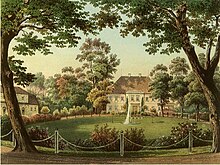Johannes Conrad (economist)
Johannes Conrad (born February 28, 1839 on Gut Borkau in the Mewe district , West Prussia ; † April 25, 1915 in Halle (Saale) ) was a German economist .
Life

Conrad's father was a landowner in West Prussia. He spent his childhood on his father's estate Plochoczin. Conrad initially devoted himself to agriculture , then, forced by physical suffering to give up practical work, studied natural sciences, and finally political science in Berlin and Jena . During his studies he became a connoisseur at Agronomia Jena, as he could not fence himself. He later founded a gymnastics association in Halle and received several ribbons of honor from other student associations . After completing his studies, he made long trips to Italy , England , France , Poland , Hungary , habilitated in 1868 as a private in Jena , was appointed in 1870 to associate professor and in the same year as professor of Halle appointed. In 1896 he was accepted as a corresponding member of the Russian Academy of Sciences in Saint Petersburg . His wife had been blind since 1909, which depressed him seriously; In 1911 he lost his wife.
From 1878 to 1890 he was the sole editor of the yearbooks for economics and statistics founded by Bruno Hildebrand in Jena in 1862 , which he had co-edited since 1872.
From 1891 to 1897, together with Ludwig Elster , Wilhelm Lexis and Edgar Loening , who were already connected to Conrad's yearbooks , he published the concise dictionary of political science in the publishing house Gustav Fischer in Jena (2nd edition 1898–1901; 3rd edition. 1909–1911) .
Under the chairmanship of Ernst Haeckel and together with Eberhard Fraas, Conrad was part of the prize committee for the competition published by Friedrich Alfred Krupp on January 1, 1900, on the question “What do we learn from the principles of the theory of descent in relation to the domestic political development and legislation of states? " on. This competition, endowed with a sensational 30,000 marks , made social Darwinism socially acceptable in the German Reich and made it attractive for politics.
Fonts
- Liebig's view of agricultural soil depletion . Jena 1864.
- University studies in Germany . Jena 1884.
- The statistics of agricultural production.
- Foundlings.
- Rodbertus' pension principle.
- Agricultural statistical studies. and other treatises in the Economics and Statistics yearbooks
- Furthermore, since 1877 he published the collection of works of the state science seminar in Halle, which was under his direction.
literature
- Wilhelm Meinhold: Conrad, Johannes. In: New German Biography (NDB). Volume 3, Duncker & Humblot, Berlin 1957, ISBN 3-428-00184-2 , p. 335 ( digitized version ).
- Albert Hesse : Johannes Conrad. In: Historical Commission for the Province of Saxony and for Anhalt (Hrsg.): Mitteldeutsche Lebensbilder. Volume 3: Pictures of Life in the 18th and 19th Century. Self-published, Magdeburg 1928, pp. 497–506.
Web links
- Literature by and about Johannes Conrad in the catalog of the German National Library
- Entry on Johannes Conrad in the Catalogus Professorum Halensis
Individual evidence
- ↑ Max Mechow, Well-known CCer, Historia Academica, Volume 8/9, pp. 34-35.
- ^ Foreign members of the Russian Academy of Sciences since 1724. Johannes Ernst Conrad. Russian Academy of Sciences, accessed September 23, 2015 (Russian).
- ^ Kurt Bayertz : Social Darwinism in Germany 1860-1900. In: Eve-Marie Engels (ed.): Charles Darwin and its effect . Suhrkamp, Frankfurt am Main 2009, ISBN 978-3-518-29503-8 , p. 200.
- ↑ Uwe Puschner : Social Darwinism as a scientific concept and political program. In: Gangolf Hübinger : European scientific cultures and political orders in modernity (1890-1970) . Oldenbourg, Munich 2014, ISBN 978-3-486-71859-1 , pp. 111-113.
| personal data | |
|---|---|
| SURNAME | Conrad, Johannes |
| ALTERNATIVE NAMES | Conrad, Johannes Ernst |
| BRIEF DESCRIPTION | German economist |
| DATE OF BIRTH | February 28, 1839 |
| PLACE OF BIRTH | Gut Borkau in the Mewe district, West Prussia |
| DATE OF DEATH | April 25, 1915 |
| Place of death | Halle (Saale) |
